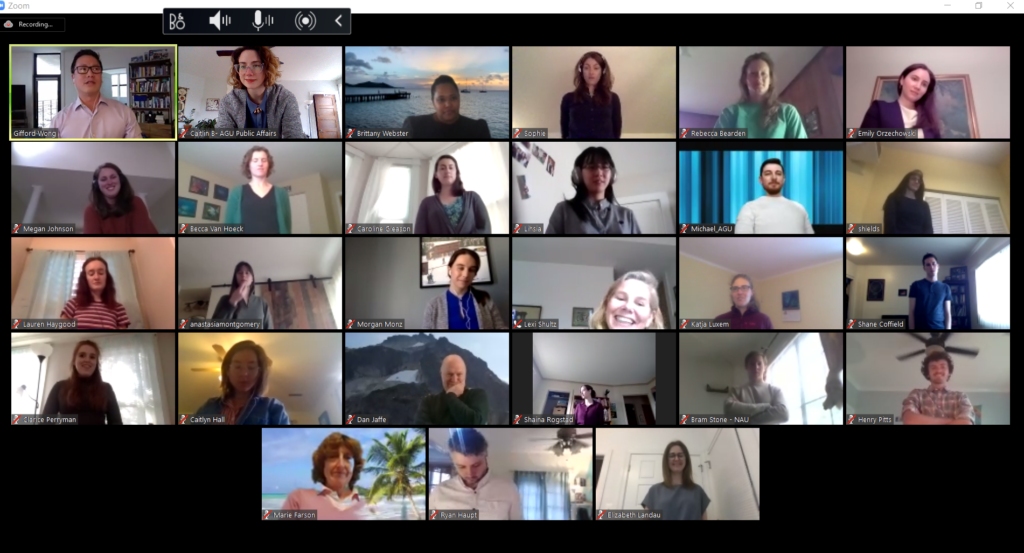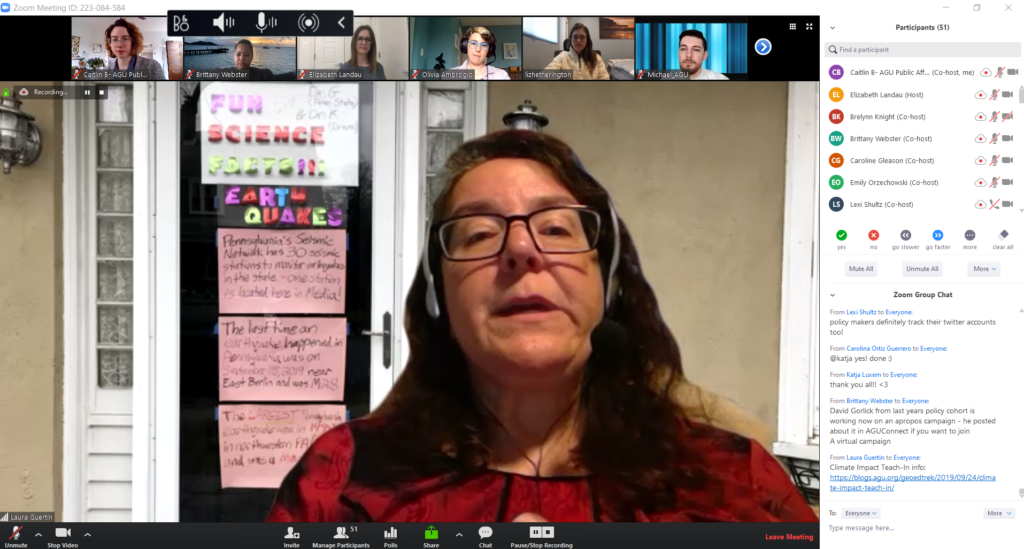April 6, 2020
Voice for Science: A Welcome with Advice from Alumni
Posted by Caitlin Bergstrom

The Policy Track participates in a virtual improv exercise with glaciologist and Improv master Gifford Wong
In 2018, AGU launched Voices for Science, a program that centers around training scientists to address the critical need for communicating the value and impact of Earth and space science to key decision makers, journalists, and public audiences. The program recruits scientists to participate in one of two tracks: policy or communications.
The Voices for Science program provides scientists in all career stages interested in science communications and outreach with specialized training to hone their skills. Throughout the twelve-month program, participants work directly with AGU staff to conduct regular outreach activities with a variety of audiences in their local communities.

2018 Alumna Laura Guertin shares her insights from the program during our virtual workshop, including some inspiration on how to engage in scicomm during social distancing. Laura decorates her door weekly with science facts for kids to learn during walks around her neighborhood.
We are excited to introduce our third and largest cohort, with 19 scientists in our policy track and 21 scientists in our communications track. This year we are doing things a little differently and are hosting our first-ever virtual workshop to help reduce the spread of COVID-19. Our participants joined us March 31 and April 1 from across the country to learn more about science policy and science communication, and how they can support each other from near and far over the next year.
AGU is thrilled to welcome these scientists and continue to build our Voices for Science community. We asked some members from previous cohorts what advice they might have for our new 2020-2021 class. Here’s what they had to say:
I cannot overstate the power of networking. When you engage peers interested in science policy and communication through campus workshops, outside conferences, or social media, you can form partnerships that allow you to reach broader audiences. Networking also provides you opportunities to communicate your values and goals more effectively by learning from both the successes and failures of your peers. –Robby Goldman, PhD student, University of Illinois Urbana-Champaign (UIUC)
I was in the first class of Voices For Science on the Policy Track. It was really fun working with AGU PA team and my fellow avengers to work on something important – sharing science and presenting the urgency of funding for science to the policymakers and the general public. The 2-day intense training workshop really transformed me from not knowing where to begin to feeling comfortable talking about my work to other people. Thanks so much to AGU and the PA team for providing this opportunity to the scientists to get involved in advocating for the science enterprise! – Dr. Tai-Yin Huang, Professor of Physics, Penn State Lehigh Valley
Take a chance and communicate what you know well. Take a bigger chance and communicate what you are learning about and the process we as scientists take to learn. Take an even bigger chance and listen to your intended audience, adding to your learning. – Heidi Steltzer, Professor of Environment and Sustainability, Fort Lewis College
I had a great time meeting the other cohort members and collaborating with them. I really wish I took more pictures! Not just of the events that I did for the program, but of all of us when we were hanging out or at the orientation workshop where everybody is together for a few days.
I suggest that the cohort members keep track of their own activities in a Word doc or something because they’ll accomplish a lot and it’ll be hard to remember everything you did when the year is over. Blog post style would be great too, so you can link the pictures, videos, and other people’s social media accounts. – Kimberly Duong, Graduate Student Researcher, Department of Civil and Environmental Engineering, University of California, Irvine
“Serving in the AGU Voices for Science Policy Track program was one of the highlights of my career in the Earth Sciences and Water Resources Spectrum. Good science is meaningless if you cannot translate it into policy, public benefits and good, and resiliency. AGU’s Voices for Science Policy Track program leverages the ubiquitous data, robust science, and societal drivers to support informed policymaking on geosciences and water resources issues from the local to the national scales with actionable policymaking intelligence. The Policy Track Team approach can be seen as an integrated geosciences and water resources policymaking “regionalization”-the coming together of states and communities that can be informed by data and enriched by information. Armed with that information, policymakers can make policy across and within boundaries that allow them to provide resiliency and to thrive in a constantly changing geosciences policy spectrum. Sending all best wishes to the 2020-2021 Voices for Science cohort as you begin the conduct of new missions! Onward, Avengers!” – Bennett L. Bearden, Chief of Staff, Assistant State Geologist, Geological Survey of Alabama
Thanks to all our past-cohort members for providing thoughtful insight on their experience with the program. We can’t wait to see what the class of 2020-2021 has in store!
Policy Track:
Rebecca Ann Bearden, Biologist, Geological Survey of Alabama/University of Alabama
Shane Coffield, PhD candidate, UC Irvine, Department of Earth System Science
Marie Farson, Assistant Professor, Principia College
Caitlyn Hall, PhD Candidate, Arizona State University
Ryan Haupt, Science Policy Fellow, University of Wyoming and Geological Society of America
Lauren Haygood, Graduate Student- Research Assistant, The University of Tulsa
Dan Jaffe, Professor, School of STEM, University of Washington
Megan Johnson, Graduate Research Assistant, North Carolina State University, Department of Civil, Construction and Environmental Engineering
Katja Luxem, Graduate Student, Princeton University, Department of Geosciences
Sophie McCoy, Assistant Professor, Florida State University
Anastasia (Stacy) Montgomery, PhD Student, Northwestern University
Morgan Monz, Graduate Student, University of Minnesota
Clarice Perryman, PhD Candidate, University of New Hampshire
Henry Pitts, Research Assistant, Surface Dynamics Modeling Lab The University of Alabama
Shaina Rogstad, Research Assistant, University of Massachusetts Amherst
Christine Shields, Associate Scientist IV, National Center for Atmospheric Research
Bram Stone, Postdoctoral Scholar, Center for Ecosystem Science and Society, Northern Arizona University
Rebecca (Becca) Van Hoeck, Graduate Research Assistant, University of North Carolina at Chapel Hill
Li Hsia Yeo, Graduate Research Assistant, University of Colorado Boulder
Communications Track:
Alexandre Martinez, University of California Irvine
Alexandrea Hurtado, CACI International Inc
Bella Bennett, Colorado Mountain College
Benjamin Brown-Steiner, MIT
Carolina Ortiz-Guerrero, University of Florida- Gainesville
Irene Crisologo, Northwestern University
Jessica Taylor, NASA GLOBE
Joao Silveira Meyers, George Mason University
Kimberly Jones, Town of Bluffton South Carolina
Kimberly (Kimi) Takagi, College of Coastal Georgia
Kristina Pistone, Bay Area Environmental Research Institute
Leila Joyce Seals, University of Kansas
Libby Ives, University of Wisconsin-Milwaukee, Department of Geosciences
Linda Stathoplos, Emerita from NOAA
Lisa Watkins, Cornell University
Melissa Scruggs, University of California- Santa Barbara
MJ Riches, Colorado State University
Pamela Grothe, University of Mary Washington
Priyanka Kushwaha, University of Arizona
Saleh Ahmed, Boise State University- School of Public Service
Tamie Jovanelly, Mount Berry College, Georgia


[…] Fonte/Source: https://blogs.agu.org/thebridge/2020/04/06/voice-for-science-a-welcome-with-advice-from-alumni/ […]